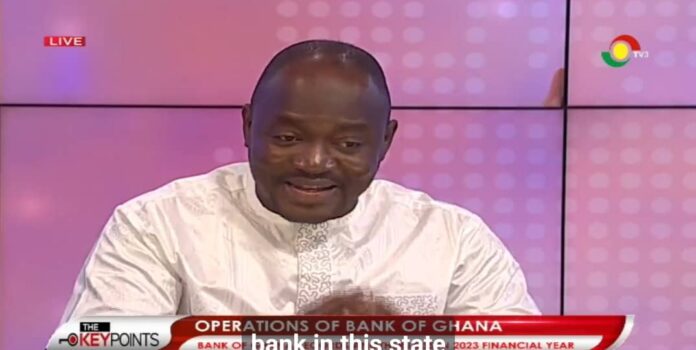The Member of Parliament for Tamale North, Alhassan Sayibu Suhuyini, has criticised the Bank of Ghana (BoG) for prioritising the construction of a headquarters whilst it is still recording huge sums of losses.
According to him, the rate at which the budget for the project is being increased is beyond understanding, stating that his sources tells him the project would subsequently be increased by an extra US$30million.
He says although the Public Procurement Authority (PPA) raised concerns with the initial US$81million budgeted for the project, it later skyrocketed to US$250, which he sources tells him would be increased further.
Speaking with Alfred Ocansey on the KeyPoints Saturday, June 08, 2024, he said the recent losses being incurred by the BoG is due to poor government policies across every facet of the economy, with the central bank’s issue being one of the reflection of the poor policies.
“For me what is even more shocking is the fact that the bank in this state seems to be prioritising a reckless construction of a headquarters. In the state that the Bank of Ghana is in today, why is the construction of a headquarters a priority? What is the threat to that building that they operate from today? They have operated there since God knows when and they have never reported any attacks or any threats. Why all of a sudden has it become so important… and go and look at the speed at which the construction is going,” he stated.
“You cannot wrap your head around it. First of all, the budget was supposed to be around US$81m and even that the PPA had problems with the figure and only for the Bank of Ghana to end up presenting, as we speak today, a budget of about US$250m. And if you look at the way the budget increases, it’s as if it’s a ‘gig’ like we say in Ghanaian parlance and so they start 81 million dollars and someone comes and say ‘but the thing my own no dey inside?’, then they slap US$30m on it then it goes to 100m and somebody also comes and they add $30m and that is how it has increased from US$81m to US$250m because the reasons that they give is not tenable,” he added.
The Bank of Ghana (BoG) announced a GH₵10.50 billion loss for the financial year ending 2023, attributing it to an increase in total interest expenses on its open market operations.
During the period under review, these expenses surged by GH₵6.7 billion.
The BoG, had, in the previous year, 2022, incurred a whooping GH₵60.9 loss due to the impairment of its holdings of government stocks and non-marketable instruments during the domestic debt exchange program.
Aside from supporting the disinflation process as part of the broader macroeconomic adjustment programme, the BoG says the rise in expenses was necessary to manage the economy’s excess liquidity.
As of December 31, 2023, the central bank and its subsidiaries had total liabilities surpassing total assets by GH₵65.36 billion.
The total operating expenses for 2023 were GH₵19.2 billion, a significant decrease from the GH₵66.9 billion recorded in 2022.
This reduction is attributed to lower impairment charges on loans and advances and the Bank’s holdings of Government of Ghana securities.
“This Open Market Operations activity, which accounted for a major portion of the loss incurred, yielded positive results,” the Bank of Ghana further explained.
The Bank of Ghana’s 2023 Annual Report and Financial Statement revealed that “the aggressive mopping up operations, contributed to slowing down inflation to 23.2 per cent by the end of 2023, significantly down from the rate of 54.1 per cent at the end of 2022.”
The BoG also says in its report that no funds were allocated for reserve appropriation, as the reserve amount was in deficit as of December 31, 2023.
The Central Bank promptly added a note on policy solvency, emphasizing its ability to generate sufficient realized income to cover the costs associated with conducting monetary policy operations.
In the opinion of the Board of Directors and Management, the policy solvency outcome for 2023 is consistent with the perspective held in 2022.













